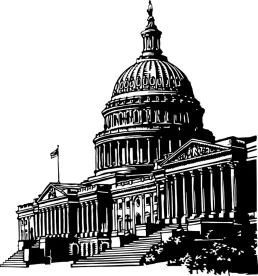The US House of Representatives returns to Washington this week, but negotiations aimed at forging a bipartisan consensus on the next federal COVID-19 response package are still weeks away. The Memorial Day holiday weekend brought a surge of activity by Americans who have been in lockdown for months and are yearning for a return to some semblance of normalcy in their lives, even if it means taking a calculated risk. The shifting dynamics outside the Beltway could gradually bolster the position of Republican policymakers who want the federal government to allow more time for the trillions of dollars already injected into the economy to take effect before another sweeping measure is enacted, even as some voices –including the editorial board of the New York Times – press the GOP for immediate action. Targeted proposals, such as a bipartisan bill to modify the March 27 Coronavirus Aid, Relief, and Economic Security (CARES) Act’s Paycheck Protection Program (PPP) that will be brought to a vote by the House this week, are likely to be the focal point of legislative activity in Washington for the time being.
Bloomberg Tax’s Colin Wilhelm notes the division between Democrats and Republicans over the next package has its roots in a fundamental difference of perspective between the two parties, with the former generally believing the goal of the next bill should be “to provide another tourniquet for the economy” and the latter believing the primary objective should be to provide “a crutch to help return it to normal.”
“The tension over whether the next package should aim to provide more aid or stimulate a reopening economy is evident in two of the key areas of disagreement: whether unemployment benefits and further federal aid to states should be extended in the next bill, which could rival or exceed the size of the [CARES Act],” Wilhelm adds. “There appears to be bipartisan momentum behind certain provisions in the House-passed response bill [the HEROES Act], including tweaking the employee retention tax credit to make it more usable, providing further financial assistance through the tax code to help businesses cover fixed costs during shelter-in-place orders, and loosening IRS rules on deductions related to loans issued under the [PPP].”
The House will conduct legislative business Wednesday and Thursday that will include floor consideration of the Paycheck Protection Flexibility Act (H.R. 6886), a bipartisan measure that would broaden the availability of PPP loans. Proxy voting measures allowing some members to cast votes without being physically present in the US Capitol will be in place for the first time in the chamber’s history, a procedure some Republicans have vowed to challenge as being unconstitutional.
Oversight of the use of CARES Act funds will continue to ramp up in Congress in the days ahead as well. A report in the New York Times examines the acceptance of millions of dollars in federal emergency funds by major hospital systems, including some that reportedly have significant cash reserves as they grapple with the challenges of COVID-19.
Tax and Economic Development Updates
With the Senate last week having failed to pass its PPP legislation – the Paycheck Protection Program Extension Act, which would have extended the PPP for 16 weeks, among other things – the House this week is expected to take up its bill to extend the program for 24 weeks. At the same time, with the program expected to be extended, the Small Business Administration (SBA) last week released further guidance implementing the PPP. Specifically, the SBA released: (1) an interim final rule that supplements the previously posted interim final rules in order to help PPP borrowers prepare and submit loan forgiveness applications as provided for in the CARES Act, help PPP lenders who will be making the loan forgiveness decisions and inform borrowers and lenders of SBA’s process for reviewing PPP loan applications and loan forgiveness applications; (2) an interim final rule that supplements the previously posted interim final rules in order to inform borrowers and lenders of SBA’s process for reviewing PPP loan applications and loan forgiveness applications; and (3) an interim final rule that revises the interim final rule posted on May 8, 2020, by extending the date by which certain PPP borrowers may repay their loans from May 14, 2020, to May 18, 2020, in order to avail themselves of a safe harbor with respect to the certification required by the Act, and by extending the timeframe for submission of the initial SBA Form 1502 report for PPP loans. The SBA also updated its list of frequently asked questions (FAQs) in order to be consistent with its updated guidance.
Additionally, in order to help consumers that have been impacted by the current economic crisis, the Consumer Financial Protection Bureau (CFPB) on Friday issued two No-Action Letter (NAL) templates under recently developed innovation policies. As the CFPB notes in its announcement, “the NALs provide increased regulatory certainty through a statement that the Bureau will not bring a supervisory or enforcement action against a company for providing a product or service under certain facts and circumstances.” The first NAL template is for mortgage servicers seeking to assist borrowers avoid foreclosure and engage in loss mitigation efforts, and allows them to apply for a NAL. The second NAL template is for use by insured depository institutions seeking to offer protections for consumers who apply for small-dollar loan products and allows these financial institutions to apply for a NAL.
Health Updates
On Friday, the Department of Health and Human Services (HHS) announced it will be distributing nearly US$4.9 billion in additional relief funds to skilled nursing facilities (SNFs). The funding, which will come from the Provider Relief Fund, will include a fixed distribution of US$50,000 per SNF, plus a distribution of US$2,500 per bed; HHS clarifies that all certified SNFs with six or more certified beds are eligible for this allocation. With news reports detailing nursing homes as particularly susceptible to COVID-19 outbreaks, lawmakers and other stakeholders have called for additional assistance for these facilities in recent weeks. President Trump announced the establishment of the Coronavirus Commission for Safety and Quality in Nursing Homes, Centers for Medicare & Medicaid Services (CMS) Administrator Seema Verma proposed a five-part plan to ensure safety and quality in these facilities and House Democrats incorporated several sections aimed at assisting nursing homes in the HEROES Act, including protections to manage safety and quality care for patients, as well as manage outbreaks and allow for infection control. HHS’s Office of Inspector General (OIG) updated its work plan this month to include an audit of nursing home infection prevention and control program deficiencies, stating its objective is “to determine whether selected nursing homes have programs for infection prevention control and emergency preparedness in accordance with Federal requirements.” As we reported last week, the Government Accountability Office (GAO) released a report titled “Infection Control Deficiencies Were Widespread and Persistent in Nursing Homes Prior to COVID-19 Pandemic.” GAO found “most nursing homes were cited for infection prevention and control deficiencies (82% of those surveyed from 2013-2017) [prior to the pandemic]. About half of these homes had persistent problems and were cited across multiple years.” HHS OIG will also review nursing home oversight during the COVID-19 pandemic.
In its updated work plan, HHS OIG included an audit of the distribution of US$50 billion from the CARES Act Provider Relief Fund. The office states: “This work will examine the effectiveness of HHS controls over the awarding and disbursement of US$50 billion in Provider Relief Fund (PRF) payments to hospitals and other providers. We will obtain data and interview program officials to gain an understanding of how PRF payments were calculated and review PRF payments for compliance with Coronavirus Aid, Relief, and Economic Security (CARES) Act requirements. Among other things, we will seek to determine whether HHS controls over PRF payments ensured that payments were correctly calculated and disbursed to eligible providers.” POLITICO reported in April that some organizations that received funds from HHS did not want the money. Walmart reportedly received US$12.6 million, which it returned to HHS; the company also requested to be excluded from future disbursements. Earlier this month, House Committee on Energy and Commerce Chairman Frank Pallone (D-NJ) and House Committee on Ways and Means Chairman Richard Neal (D-MA) wrote a letter to HHS Secretary Alex Azar and CMS Administrator Verma, expressing concern over the methodology and lack of transparency used for Fund distributions. Democratic lawmakers have been critical of the ways in which HHS has distributed the funds, and the House Democrats’ HEROES Act seeks to remove HHS discretion through codifying the Fund. Yesterday, the New York Times called additional attention to the Fund, reporting that hospitals with larger financial reserves received more federal aid than smaller, poorer hospitals.
Senate Democrats released a plan to expand health coverage in response to COVID-19. In their white paper, Senate Committee on Finance Ranking Member Ron Wyden (D-OR), Senate Committee on Health, Education, Labor, and Pensions (HELP) Ranking Member Patty Murray (D-WA), Senator Jeanne Shaheen (D-NH) and Senator Tina Smith (D-MN) outline various provisions that have been prominent in Democrats’ health policy dialogue during the pandemic and in recent years. The senators state their proposal “prioritizes quality, affordable health care and makes it available to every American family when they need it,” while “the Trump Administration’s efforts . . . make health care harder to access.” The senators include provisions to cover all costs of COVID-19 treatment, subsidize the cost of COBRA premiums for newly unemployed individuals, expand and increase premium tax credits for monthly premiums, incentivize Medicaid expansion in states that have not yet expanded their programs, establish a federal special enrollment period of Obamacare marketplaces, ban the sale of short-term limited-duration insurance and restore funding for marketplace outreach and enrollment support. The proposal includes the support of 33 Democratic senators – including Senate Minority Leader Chuck Schumer (D-NY) and Senate Minority Whip Dick Durbin (D-IL) – but not all Democrats put their names on the plan. Perhaps demonstrating that intraparty agreement on health policy is difficult, senators on both the more liberal and moderate sides of the political spectrum have left their names off the proposal, including Senators Elizabeth Warren (D-MA), Bernie Sanders (I-VT) and Joe Manchin (D-WV).
In accordance with the Paycheck Protection Program and Health Care Enforcement Act, HHS submitted its report to Congress on its COVID-19 Strategic Testing Plan. Public health experts and Democratic lawmakers criticized the plan, advocating for more federal control over testing; the administration has sought to have states take lead on testing initiatives and implementation. In a joint statement, House Speaker Nancy Pelosi (D-CA), Senate Minority Leader Schumer, House Committee on Energy and Commerce Chairman Pallone and Senate HELP Committee Ranking Member Murray panned the plan as insufficient and disappointing, stating, “In this document, the Trump Administration again attempts to paint a rosy picture about testing while experts continue to warn the country it is far short of what we need. We still need clear explanations for how targets were set, how they will be met and what will be done if they are not. The Trump Administration still does not take any responsibility for ramping up our nation’s testing capacity, instead pushing the burden onto states – forcing states to compete with each other to procure vital supplies to administer tests from the private market.” With President Trump eager to reopen the country and improve the economy, the Washington Post notes, “Democrats are positioning themselves as the party of gradual caution and concern for health, while Trump claims the space of bold action and bullishness.” Meanwhile, more businesses are seeking to reopen or continue operations without interruptions, as well as avoid liability for potential COVID-19 outbreaks. The Wall Street Journal reported yesterday that companies are asking more workers to submit to coronavirus tests, though the logistics of such testing initiatives are “imperfect at best.”
Trade Updates
On May 24, the White House issued a new presidential proclamation expanding its COVID-19 travel ban to include those seeking to enter the US from Brazil. The new proclamation issued on Sunday, May 24, bars all non-US citizens who have been physically present in Brazil during the 14-day period prior to entering or attempting to enter the United States. Further information on this development is available here. According to POLITICO, President Trump may sign an executive order as soon as this week expanding his April action limiting the issuance of new greencards to additional categories of individuals seeking entry into the United States, such as those participating in cultural exchanges and those attending US colleges that are hired for temporary employment, among other categories reportedly under consideration.
European Policy Updates
On May 20, the European Commission issued a reoriented European Semester Spring Package taking into account the impact of the COVID-19 pandemic. The 27 country-specific economic recommendations (CSRs) that are part of the package highlight a short-term priority, (mitigating the pandemic’s socio-economic impact) and a medium-term priority (facilitating sustainable and inclusive economic recovery). The recommendations cover, among other topics, investment in the public health sector; employment of affected workers; support to the corporate sector, especially small and medium enterprises; and fiscal measures reflecting the general “escape clause.” Some of the reforms deemed essential for the EU prior to the outbreak remain relevant in the reviewed package. Achieving competitive sustainability also remains a core priority. The Commission called on the European Council to endorse and adopt these CSRs, and Member States to implement them effectively. As part of the package, the Commission also adopted reports monitoring fiscal developments in each Member State, except Romania, to assess progress with regard to the 3% deficit limit. In light of the likely severe impacts of the COVID-19 crisis, the Commission decided to postpone its decisions about potentially launching excessive deficit procedures. The European Semester Spring Package also includes the sixth enhanced surveillance report for Greece and post-program surveillance reports for Spain and Cyprus.
In response to repeated calls from humanitarian organizations, such as the United Nations Global Appeal, the European Commission will provide €50 million to support humanitarian efforts required in the context of the COVID-19 pandemic. This funding adds up to the €30 million EU allocation to the World Health Organization and the establishment of an EU Humanitarian Air Bridge.
The “HG nCoV19 test” project received approval to place its portable diagnostic system, which detects viral infection in 30 minutes, on the EU market. Coordinated by the Irish company HiberGene, this initiative is part of 18 other EU funded projects that were developed under the EU’s Funding Program, Horizon 2020, to research solutions to the coronavirus pandemic. The project was selected under the first emergency call launched by the Commission in January, with a budget of €48.2 million. The Commission recently announced another call for expressions of interest with a significant budget of €122 million.
With two new key pieces of legislation, the German legislature has taken initial measures to ensure the functioning of the public health system in an epidemiological emergency and to mitigate the negative financial consequences of the situation in the health care sector. This update from our Frankfurt office outlines the numerous legal amendments and regulatory powers introduced in Germany to deal with the COVID-19 pandemic.
In addition, the German Federal Government has launched a series of assistance packages containing measures for business against the consequences of the COVID-19 pandemic. In particular, the government believes that start-ups and growing technology companies are particularly important for the German economy. This summary addresses the support that will be provided to different types of companies.
On May 22, the UK Government (which had not to date placed restrictions at the border) announced a 14-day compulsory quarantine (self-isolation) for all people arriving at UK borders as part of its unlocking program. The quarantine requirement will take effect beginning June 8, with exemptions for road haulage, medical professionals, foreign officials and some others; the Common Travel Area with Ireland is unaffected.
Oversight Updates
Today, the House Committee on Oversight and Reform will hold a member briefing, at which Christi Grimm, the HHS principal deputy inspector general (IG), will testify by video. The briefing will address the IG’s April 6 report (a report criticized by President Trump and the apparent basis for his decision to effectively remove her by nominating a permanent replacement) on the resource challenges hospitals have faced during the pandemic, including shortages of testing supplies and personal protective equipment. The briefing also will cover the IG’s upcoming assessment of other aspects of the Administration’s coronavirus response, including the state of the Strategic National Stockpile, the health and safety of HHS employees and the department’s preparedness.
On Friday, Representatives Carolyn Maloney (D-NY), the Chair of the House Committee on Oversight and Reform, and James Clyburn (D-SC), Chair of the Select Subcommittee on the Coronavirus Crisis, and three other lawmakers sent a letter to the President, criticizing his decision to send hundreds of ventilators to Russia at a time when the United States continues to urgently need them. The members further complained that the President took this action without any policy in place to determine which countries need US support the most and whether providing assistance to any particular country advances US national security and foreign policy interests.
Also on Friday, several House Democrats, including Chair Maloney, introduced legislation to protect IGs from political retaliation. The Inspector General Independence Act would permit the President to remove an IG only for a specified cause, such as permanent incapacity or conviction of a felony, and would require documentation of that cause to be provided to Congress. Currently, the President need only provide Congress with 30 days prior notice and his reasons for the removal in writing. The bill comes in the wake of several recent IG firings and demotions by President Trump, namely, the IGs of Department of State, Transportation, Defense and, as noted above, HHS. Its provisions mirror the IG protections in the HEROES Act introduced by the House earlier this month.
Additionally:
- Another person was charged on Friday with fraud related to the PPP. The defendant allegedly submitted fraudulent documents to two lenders as part of his efforts to secure over US$1.5 million in PPP loans.
On Friday, the New Yorker published an interview with Bharat Ramamurti, one of the four members of the Congressional Oversight Commission established by the CARES Act. In it, Ramamurti discussed CARES Act relief programs, including the PPP and the Treasury/Federal Reserve lending facilities, growing unemployment and the HEROES Act. He also shared his initial impressions of how Commission members are working together. While Ramamurti conceded that it is “hard to predict” whether the two Republican and two Democratic members of the Commission will always agree on things, he believes that all four members are “committed to robust oversight” and will collaborate in “good faith.” While still lacking a chair (to be appointed jointly by Speaker Pelosi and Leader McConnell), the Commission issued its first report on May 18, as previously reported.







 />i
/>i

